The Kanga League was once played during the monsoon in Mumbai before it was reformatted. A look at those wet days of cricket with a bit of mirth thrown in
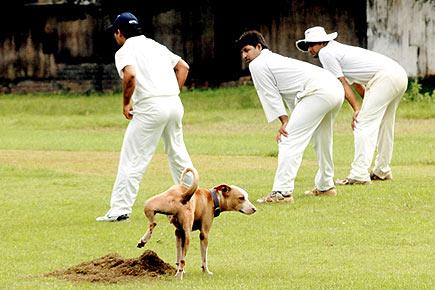
The Dadar Union SC team which won several Kanga League titles in the 1970s
 Nowadays franchises pay bags of money to players to buy their loyalty, their dedication to the team. But Kanga League had little money to offer players. All it had was the sheer pleasure of playing the sport.
Nowadays franchises pay bags of money to players to buy their loyalty, their dedication to the team. But Kanga League had little money to offer players. All it had was the sheer pleasure of playing the sport.
ADVERTISEMENT
Shishir Hattangadi, former Bombay captain calls the Kanga League ‘the spirited curtain raiser of Bombay cricket’. ‘It was tough and intense,’ he says, ‘but had its light moments that kept it going. ‘The uncovered monsoon pitches make batting an experience, and bowling a luxury. Playing for Karnataka Sporting Association in my first year in the B Division, I encountered colourful characters that had a lasting impression on me.’
For former Bombay captain Milind Rege, Kanga League was about being made to persevere with wit. Rege remembers his captain Vasu Paranjpe as the wittiest cricketer one could have known. ‘After a long spell on one steamy afternoon, I bitterly complained to captain Paranjpe. “It is too humid,” I said. At once he stopped the game and told our twelfth man to bring an umbrella. The player did, Paranjpe promptly handed it over to me and said, “Go on son, hold on to it with one hand and continue with your spell.” The entire team was in splits.
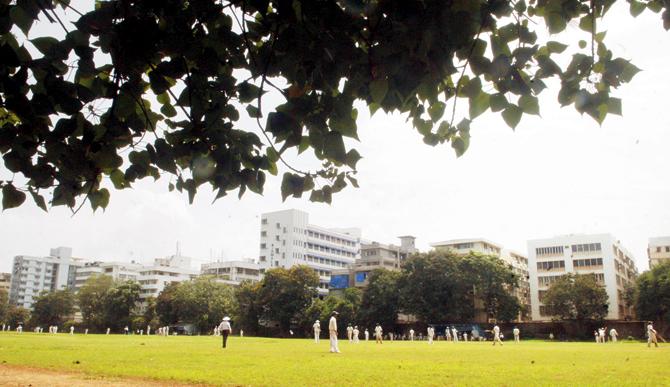
Green Scene: The Dr HD Kanga Cricket League in the monsoon gave cricket its Kodak moment
Urmikant Modi was one of the deadly bowlers in Kanga League. He remembers one match against Shivaji Park Gymkhana when he was bowling, and facing him was the great batsman Vijay Manjrekar. ‘I was bowling round the wicket and the ball hit his right pad, (in my opinion he was plumb lbw), and I appealed for an lbw, which umpire Mr. Gothoskar declined. The second delivery hit him on the pads and I appealed again, and Vijay bhai used foul language to mock me about my appealing.
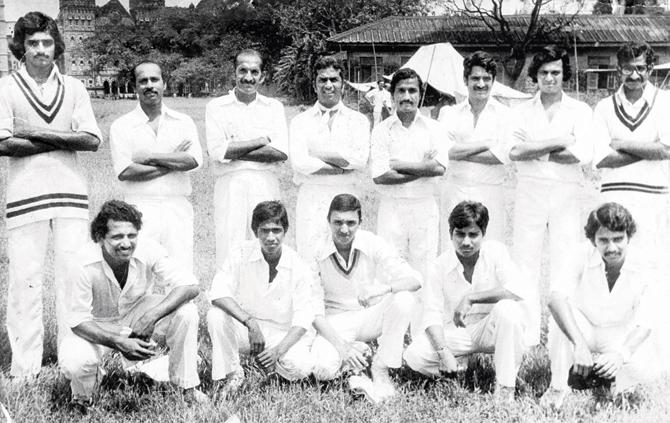 Album time: The Dadar Union SC team which won several Kanga League titles in the 1970s. Pic courtesy: Late Pradeep Vijayakar collection
Album time: The Dadar Union SC team which won several Kanga League titles in the 1970s. Pic courtesy: Late Pradeep Vijayakar collection
Since he used foul language, I could not stand it and I told him, “A player of your calibre knows when you are out lbw; you aren’t going hence I have every reason to appeal. “This was a time when I was the baby of the team. Mr. Madhav Mantri who was my captain was in first slip and shouted at me: “Urmi, go back and bowl, no arguments”. I had to go back to my end to bowl. On the next day, Manjrekar was at the Shivaji Park bus stand and I was riding my scooter to go to office. I saw him and offered him a ride to his office.’ The bottom line that Modi wants to emphasize is that even if there was great tension on the ground, it was traditional rivalry and off the field, the friendships forged during the games were carried, not the tiffs.
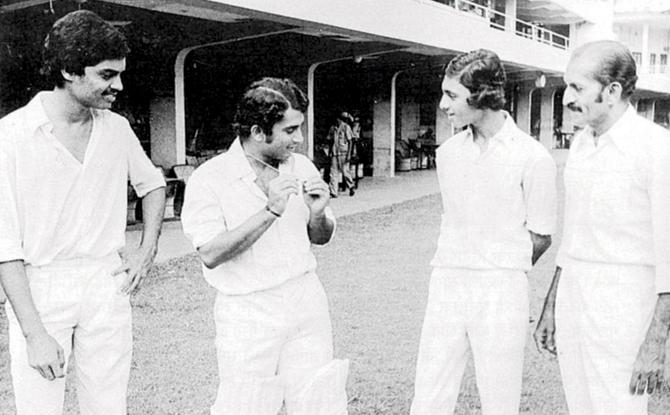
Sunny skies: Sunil Gavaskar with Dilip Vengsarkar (left) and Dadar Union SC teammates, the late Ghulam Shaikh & Vithal Patil in the 1970s
Yajuvendra Singh is one of the former India players whose association with the Kanga League has survived many years now. He played his last match ((for Jolly Cricketers) in the mid-1990s. He playfully remembers how former players made life fun and difficult for them. ‘There were so many lovely moments. It so happened that I had just returned from playing professional cricket in England (in 1980). But the Jolly antenna had kept track of my arrival. It was the last match of the season and we needed a win to become champions. We fielded first and while attempting to catch a tail-ender at slips, the middle finger of my right hand got dislocated. It was the first time I had encountered such an injury and seeing a twisted, disjointed finger, my cry for help was quite demanding.

The rest is piss-tory. Fielders keep an eye on the ball, as a dog does his business behind them at Cross Maidan. Pic/Atul Kamble
We had in our side Dr Vishwas Raut who promptly came up, looked at it and clicked the finger joints together. Before I could even scream or make a tantrum, he tightly bandaged it and said, “Stop making a noise, you are perfectly okay.”‘ Singh continues, ‘The time for me to bat was soon to come and my team was dependent on my performance. Even before the openers went in to bat, Doctor Raut made me wear my batting gloves. I had little idea that he did it because I might not have been able to put them on when my fingers swelled up later. In typical Bombay cricket style, there was no sympathy or mollycoddling from any of my teammates. They wanted runs and they wanted me to get them. When I came back from the match and took off my gloves, my finger had swelled up quite nastily. I was out of cricket for nearly two weeks after the incident. But after all this, all I can say is that it was definitely worth being a part of the Kanga League winning side.’
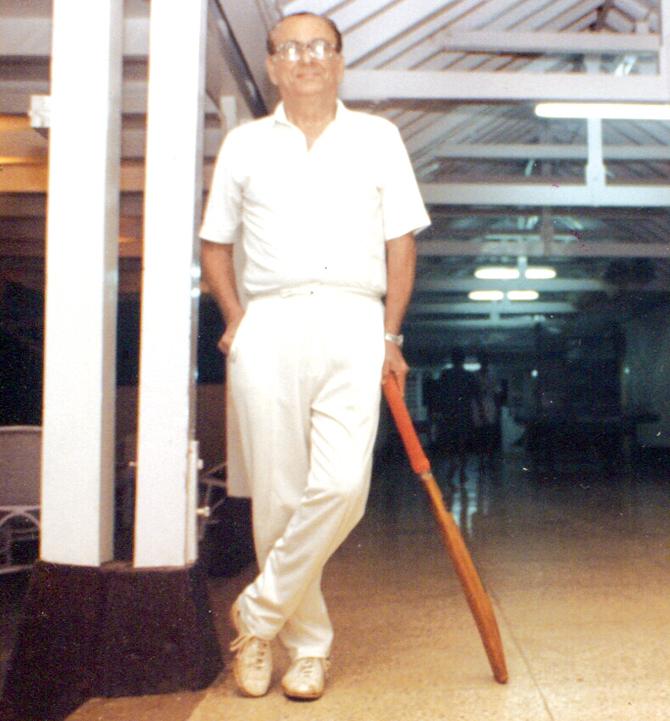
Kanga league veteran: Mehli Irani
A passionate club player and a famous cartoonist, Austin Coutinho has followed many events of Bombay cricket closely. Below he narrates the grand tale of why and how the ‘10-overs-per-hour’ rule came to be implemented in the Kanga League. ‘It was the season of 1984–85. Parsi Cyclists were playing a very strong Karnataka S.A. side at the former’s home ground at the Azad Maidan. KSA scored a quick-fire, ninety-odd runs and declared to put the Parsi batsmen in on a drying wicket. B S Sandhu, Suresh Shetty and Austin Coutinho ran through the side. The hapless Parsi Cyclists’ batting order capitulated for thirty-odd runs, Coutinho claiming six of the wickets.’
Vasudev Tumbe, the KSA skipper, wanted an outright win and thereby score full points. Thus, he instructed his batsmen to get quick runs. He then declared, setting the Parsi Cyclists a target of 100-odd runs. Coutinho remembers the veteran Mehli Irani as saying in typical Parsi style, ‘I knew that Karnataka are a very good team but I didn’t know they are greedy too!’
Shyam Nair, the Air India batsman, opened the innings and scored twenty runs in the first two overs itself. Another 20–25 runs came in the next 3–4 overs. It is to be noted that Kanga League overs, till a few years ago, consisted of eight balls per over. Says Austin Coutinho: ‘The KSA bowlers were at their wits end. But Tumbe, the shrewd tactician that he was, wasn’t shaken. He instructed his bowlers, Shetty and Sandhu to take long run-ups and bowl not more than five or six overs in the one hour of play left. This was within the rules of Kanga League till then. Shetty started his 50-yard run up from the Bombay Gymkhana boundary line, while Sandhu started from the Prabhu Jolly wicket.
‘When stumps were drawn, Parsi Cyclists were very close to the target, falling short by a few. But for the reduced number of overs, Parsi Cyclists would have won a famous match. Understandably protests spurted and the Kanga League Committee of Bombay Cricket Association decided to implement the ten-overs-per-hour rule, and eight-ball overs rule in the monsoon league.’
The Kanga League is another example of how Indians have contributed to the sport of cricket: it is an ingenious contribution of Bombay to cricket.
Excerpted from A Million Broken Windows – the magic and mystique of Bombay cricket by Makarand Waingankar published by HarperCollins. Price: Rs 399
Click here for mid-day 36th anniversary special
 Subscribe today by clicking the link and stay updated with the latest news!" Click here!
Subscribe today by clicking the link and stay updated with the latest news!" Click here!







